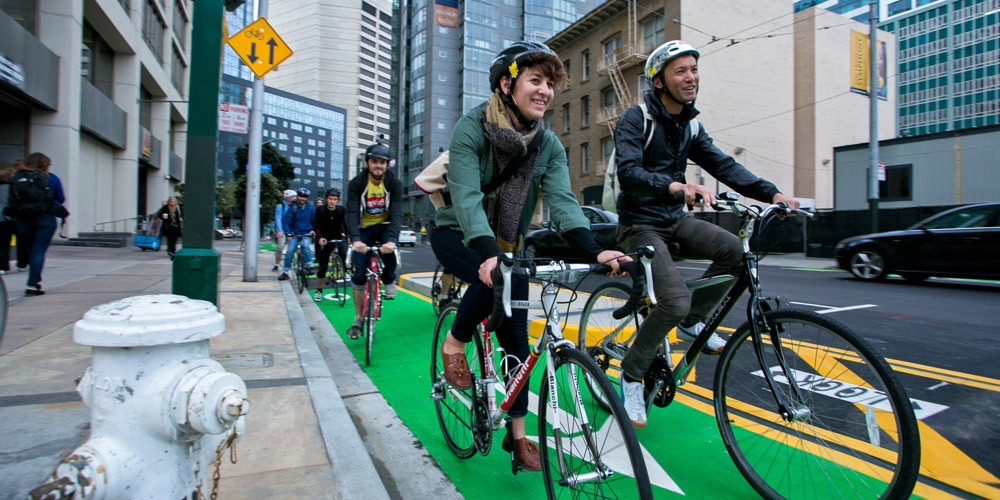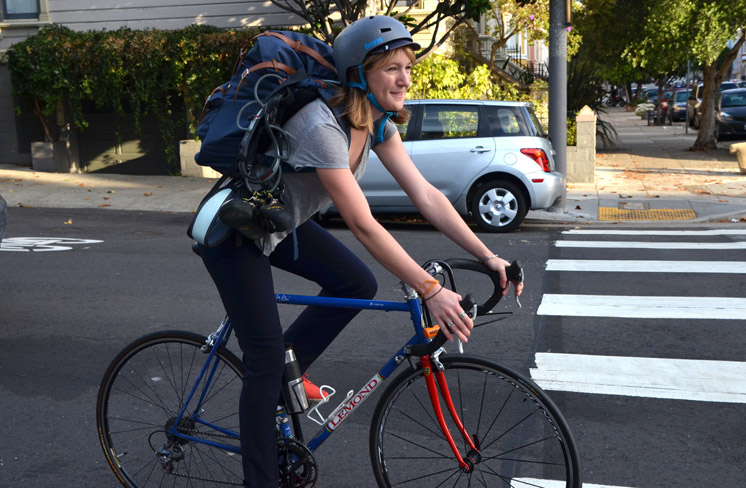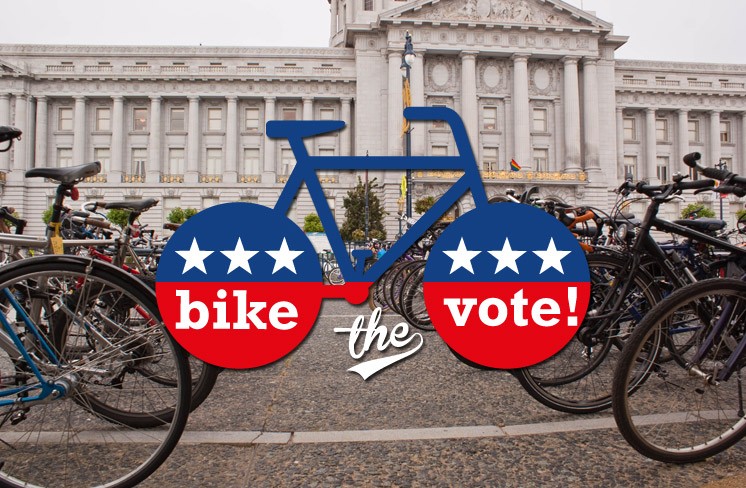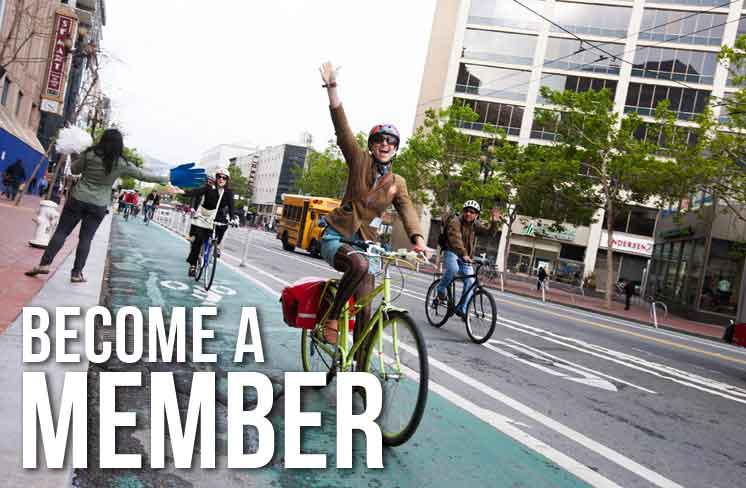This article first appeared in the Fall 2014 edition of our quarterly newsletter, the Tube Times. For this story and more, download the Fall 2014 PDF.
With votes on three transportation ballot measures, five Board of Supervisors seats and a BART Board of Directors position, the November 4 election will be significant in deciding the future of how we move around San Francisco for decades to come.
The local transportation measures that San Francisco voters will weigh in on — Propositions A and B (Yes!) and L (No!) — reveal that San Francisco is at a crossroads in terms of how we approach transportation.
Will we be a city catering to planning that subsidizes “easy” parking over livable streets? Will we commit to real Transit-First policies or roll back to 1950s, car-is-king transportation planning? Will we choose to invest in a top-notch bicycling infrastructure, or will we pedal along with the status quo?
Our city’s population has grown by 30,000 people since 2010, and we’re expected to continue to grow by more than 10,000 every year. Our local decisionmakers will have to make some clear, and some would say tough, choices about transportation priorities and funding. These are choices that will determine how accessible, affordable, safe and family-friendly city our city is for many decades to come. As San Francisco residents and voters, we have an important role to play.
Where are We Now? Understanding Transit-First
In 1973, San Francisco adopted an official Transit-First policy which commits our City to prioritize biking, walking and transit over private auto use. The City Charter was even adapted to reflect this Transit-First policy, a commitment that is good for the safety and health of San Franciscans, and one that benefits our city’s economy and livability as a whole.
Unfortunately, this policy has been name-only in too many ways. Despite the Transit-First priorities, many of our city streets are still far from comfortable for people bicycling and walking, and many streets still feel downright dangerous.
While bike trips are growing exponentially (15% of all trips in some SF neighborhoods), biking still receives only about 1% of the City’s transportation budget; pedestrian safety projects receive a similarly dismal amount. And anyone who relies on public transit knows that Muni is far from the world-class transit system our city deserves.
Prioritizing Transit-First is the only policy that will allow us to move the huge numbers of people visiting, living and working in SF. San Francisco is the second most densely populated city in the country, next to New York City. That should inspire, not daunt, us to truly invest in Transit-First.
New York City has long been leading the way in prioritizing transit, and they have begun to out-pedal San Francisco in bicycling improvements, adding 300 miles in the past five years. And thanks to strong leadership in another big city, Chicago has committed to 100 miles of crosstown bikeways. Even car-centric Los Angeles has added 40 miles of bikeways this year.
While San Francisco is still pedaling strong in terms of bike ridership (up 96% since 2006), we’re falling behind in terms of the City’s investments of bike, pedestrian and transit funding and on-the-ground improvements. In short, we simply have not seen the strong local leadership and urgency to improve our transportation system that New York City, Chicago and Los Angeles have seen in the past five years. We can, and must, do better.
We need to help elect leaders who will commit to and follow through on Transit-First priorities to move our city forward. Check out the SF Bicycle Coalition’s endorsements of the most bike-friendly candidates running for the SF Board of Supervisors and the BART Board of Directors here.

How a Yes on Propositions A & B Will Improve Your Commute
The three transportation measures on this November’s local ballot present wildly different visions for our city’s future.
One pair, Proposition A and Proposition B, honors Transit-First by making much-needed investments in our city’s sustainable transportation systems, including $126 million in combined funding for bicycle and pedestrian safety projects.
Proposition A renews current property bond taxes to fund over $52 million for better bikeways, including $22 million for the long-awaited Better Market Street, which we expect to include protected bikeways from Octavia Boulevard to the Embarcadero. Prop. A would also make investments of $68 million for pedestrian improvements, $22 million for signal upgrades and $358 million to improve Muni. Since it’s simply renewing a current property bond, Proposition A does not raise taxes and will result in markedly better transportation options for all of us, as well as a healthier, greener and more economically vibrant San Francisco.
Proposition B also provides valuable funding for road safety improvements and Muni by better aligning the funding that goes to the SF Municipal Transportation Agency to reflect San Francisco’s population growth. Proposition B will add city population to the formula that determines our transportation spending levels, which only makes sense as the demands on the transportation system grow. In the first year, it would likely mean an extra $6 million for Vision Zero projects and an additional $16 million to improve Muni.
It is worth noting that as other sustainable funding sources come online (including a Vehicle License Fee increase in 2016, for which we’ve worked hard to win political commitments), this Prop. B source would phase out. It is an important near-term funding measure that helps fill real holes in current bicycle, pedestrian and transit safety funding.

Proposition L Would Roll Back Progress on Biking and Beyond
Along with these two forward-looking initiatives that would invest in better biking and sustainable transportation, another one, unfortunately, threatens to do just the opposite.
Republican-led Proposition L would roll back decades of progress toward making our transportation system more accommodating to people biking, walking and taking transit, forcing the SFMTA to prioritize free-flowing automobile traffic as a top priority and stealing money from bike, pedestrian and transit projects.
While it’s true that Proposition L is only a policy declaration attempting to weaken San Francisco’s Transit-First policy, it does threaten progress toward completing a full citywide Bike Network, implementing real rapid transit improvements and reaching Vision Zero for safe streets.
While misleadingly couched in populist language, calling it an effort to “Restore Transportation Balance,” the reality is that the proponents of Proposition L are directly attacking Transit-First priorities, aiming squarely at halting future bicycling improvements and even rolling back current bike safety investments.
Asked by the San Francisco Bay Guardian what he’d like to see in San Francisco transportation policy, Prop. L proponent David Looman aimed directly at biking, saying:
“Let’s go back 10 years, before the proliferation of bike lanes and increased parking fees.”
In fact, we have heard reports of the Prop. L proponents calling this the “anti-Bike Coalition” measure.
The irony is that Prop. L will make things worse for all road users — including those who drive. Creating more parking, adding more traffic lanes and offering fewer transit, bike and walking options will mean increased traffic congestion and traffic jams. Meanwhile, the growing number of people biking and walking will experience less safe streets.
Proposition L would also take money away from Muni, further impacting an already overburdened and underfunded network. In short, do you want to see SF’s progressive transportation policies put in reverse? L, No!
Transportation Touches Everything
This year’s SF Bicycle Coalition Golden Wheel Awards keynote speaker, Aaron Naparstek, summed it up best when he said “transportation touches everything.”
From public safety to the environment to equity and affordability, transportation is at the center of it all. Investing in healthy, sustainable and affordable transportation improvements will make our city a better place to live, work, shop and play.
After housing, transportation is the largest monthly expense for most San Franciscans, disproportionately affecting lower income residents the most.
San Francisco is a great city, but it hasn’t happened by accident. We’ve spent years investing in the things that help cities flourish: open spaces, small neighborhood plazas, a beautiful waterfront, accessible transportation and protected bikeways.
San Francisco has invested too much into our streets to go backwards. Our community is ready to be a leader when it comes to building streets that spur community engagement, protect public safety and reduce our environmental impact.
We deserve streets that are safe for all users, and public spaces we can be proud of, not roads we are afraid to use. We deserve places that knit together the fabric of our community and local economy. We deserve systems that provide access for our elderly and our disabled, and sidewalks that we’re not afraid to let our children walk on. In order to do that, we have to band together and build a city that works for all of us.
Your San Francisco Bicycle Coalition is working with diverse partners to support Propositions A and B and to stop Proposition L. We need your help to reach beyond our own members to inform people about the importance of this election.
Here’s what you can do:
- Share this article with friends
- Sign up on to volunteer at sfbike.org/vote
- Hang up a window sign (see sfbike.org/vote)
- Donate to the No on L campaign at nogridlocksf.com
- Use #bikethevote to promote Yes on A & B, No on L in social media
This fall, voters will have a choice. Will we move San Francisco forward or roll backwards? The choice is yours!


